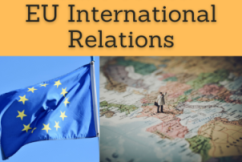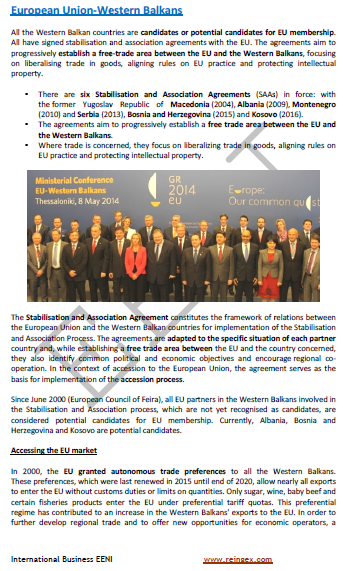European Union-Western Balkans Bosnia

EU's policy for the Western Balkans, Albania, Bosnia, Macedonia, Serbia
- Introduction to the Western Balkans region: Albania, Bosnia and Herzegovina, Macedonia, Montenegro, Serbia and Kosovo
- European Foreign Policy for the Balkans
- Stability Pact for South-Eastern Europe
- Stabilization and Association Agreements
- Baltic-Adriatic Corridor (Poland, Slovenia)
- Free-Trade Area between the EU and the Western Balkans
- Foreign Trade Relations between the EU and the Western Balkans
The aims of the subject “EU-Western Balkans” are the following:
- To know the EU Trade Policy for the Western Balkans region
- To analyze the association agreements and the trade relations of the EU with the Western Balkans countries

The Subject “European Union-Western Balkans” belongs to the following Online Programs taught by EENI Global Business School:
Doctorate: European Business, World Trade.
Masters: International Business, Foreign Trade.

Languages:  or
or  UE-Balcanes Occidentales
UE-Balcanes Occidentales  UE-Balkans occidentaux
UE-Balkans occidentaux  UE-Balcãs Ocidentais.
UE-Balcãs Ocidentais.

Masters for the Students from  Albania,
Albania,
 Bosnia, Croatia,
Bosnia, Croatia,
 Macedonia,
Macedonia,  Serbia, Kosovo and
Serbia, Kosovo and  Montenegro.
Montenegro.
Masters for the Students from the  EU.
EU.

Sample - EU-Western Balkans Trade Relations

The Trade relations of the EU with the Balkans states (Albania, Bosnia and Herzegovina, Croatia (*), Macedonia, Montenegro, Serbia, and Kosovo) are governed by the Stabilization and Association Process.
(*) Croatia is a member of the EU since 2013.
- All the Western Balkans countries have been offered a Stabilization and Association Agreements and have a clear European Union perspective
- Albania, Bosnia and Herzegovina, Macedonia, Montenegro, Serbia and Kosovo are candidates for the EU membership
- The EU Strategy includes massive financial assistance, making it by far the largest donor in the region
- The EU will continue providing technical and financial assistance to the Central European Free Trade Agreement (CEFTA)
Foreign Trade EU-Balkans (in Euros):
Foreign Trade plays a major role in the efforts of the EU to promote the peace, stability, freedom, and economic welfare in the Western Balkans.
- The EU exported products to the Balkans: 25.5 billion
- The EU imported goods from the Balkans: 11.2 billion
- The EU's Foreign direct investment in the Balkans: 3.8 billion

(c) EENI Global Business School (1995-2024)
We do not use cookies
Top of this page



